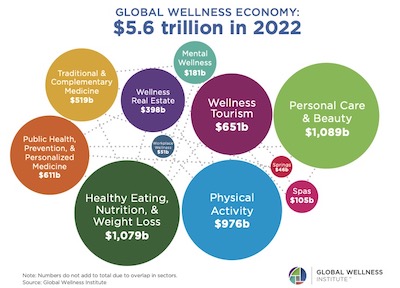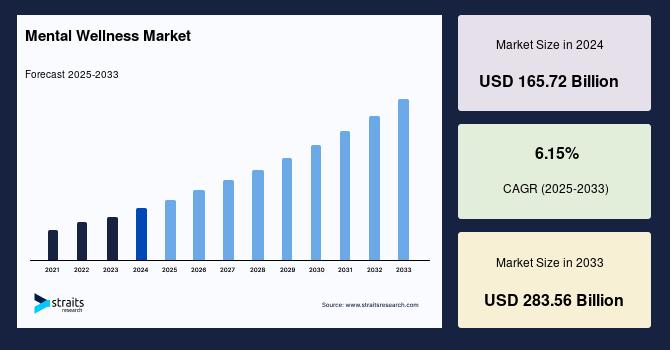In an era where the complexities of life seem to multiply rapidly, mental wellness has emerged as a pivotal concern for individuals and societies alike. The landscape of mental health is evolving, guided by increased awareness and a growing consensus that mental wellness is as essential as physical health. With approximately 970 million people globally grappling with mental disorders, including prevalent conditions such as anxiety and depression, the need for informed dialogue around mental wellbeing has never been more urgent [2].
As we navigate a myriad of modern challenges-from the implications of social media connectivity to the pressures of an ever-competitive world-understanding the latest trends in mental wellness is vital. This guide endeavors to shed light on contemporary approaches, innovative practices, and evidence-based strategies that can empower individuals on their journey to enhanced mental health. Join us as we explore the transformative trends reshaping mental wellness today, providing insights that can foster resilience, connection, and personal growth.
Understanding the Rise of Mindfulness Practices in Daily Life
The rise of mindfulness practices in daily life is a response to the fast-paced, often chaotic world we inhabit. People are increasingly recognizing the need for mental clarity and emotional resilience, steering them toward practices that promote inner peace. As mindfulness becomes integrated into various aspects of everyday routines, it is no longer confined to meditation sessions. Instead, individuals find joy in incorporating mindfulness into activities such as:
- Mindful eating: Savoring each bite and recognizing the flavors enhances the experience of meals.
- Mindful walking: Being present during walks allows one to connect with nature and find tranquility.
- Mindful technology use: Setting intentional timeframes for device use helps cultivate awareness in a digital age.
This evolution signifies a cultural shift where the ancient practice of mindfulness is adapted for modern needs. Recent studies show that this heightened consciousness is linked to improved mental health outcomes, fostering a society equipped to handle stress more effectively. Mindfulness is increasingly supported by science, demonstrating benefits such as:
- Reduced anxiety: Regular practice can significantly lower feelings of anxiety.
- Enhanced focus: Mindfulness helps sharpen attention spans, which are often diminished in the digital landscape.
- Improved relationships: An increased capacity for empathy and understanding is cultivated through mindful interactions.

The Role of Technology in Enhancing Mental Health Support
In recent years, technology has emerged as a powerful ally in the pursuit of mental health support, making it easier for individuals to access resources and services tailored to their needs. From mobile apps that offer mindfulness exercises to online therapy platforms, the digital landscape provides a variety of innovative tools that enhance personal well-being. Key benefits include:
- Increased accessibility to mental health resources
- Personalized interventions based on user data
- Community-building through virtual support groups
This democratization of mental health care is crucial, especially for underserved communities. For instance, research shows that only a small percentage of mental health apps provide language support for the Latinx community, highlighting an important area where digital tools can still evolve to meet diverse needs (1).
Moreover, technology allows for a more dynamic approach to mental health treatment. Evidence suggests that selective and targeted use of tech can enhance the quality of care by facilitating active user involvement and feedback. Some examples of how technology enhances mental health support include:
- Telehealth services that connect patients with professionals remotely
- Wearable devices that monitor stress and emotional states
- Data analytics to tailor treatment plans
This integration not only addresses individual concerns but can also help therapists craft more effective strategies for their patients, ultimately leading to better outcomes (2).
Exploring Holistic Approaches: Integrating Body and Mind
Holistic approaches emphasize the interconnectedness of the body, mind, and spirit, creating a comprehensive framework for understanding mental wellness. This perspective promotes the idea that mental health is not merely the absence of illness but a dynamic equilibrium that involves emotional, social, and physical well-being. By considering factors such as nutrition, exercise, mindfulness, and social connections, individuals can foster resilience and enhance their overall mental health. Common practices include:
- Meditation and mindfulness: Techniques that cultivate a deeper awareness of thoughts and feelings.
- Nutrition: Emphasizing whole foods and balanced diets that nourish both body and mind.
- Physical activity: Regular exercise as a means to boost mood and reduce stress.
Integrating these elements can lead to profound improvements in mental wellness, promoting long-term benefits rather than temporary fixes. This multifaceted approach can be particularly effective when tailored to individual needs, encouraging personal responsibility in the journey towards better health. Furthermore, programs that incorporate holistic principles, such as community support groups or therapy that includes alternative modalities, are increasingly recognized for their efficacy. Consider the following benefits:
| Benefit | Description |
|---|---|
| Enhanced Resilience | Developing coping strategies to better handle life’s challenges. |
| Improved Focus | Enhancing cognitive function through mindfulness practices. |
| Stronger Connections | Building supportive relationships that foster mental health. |
Community Connections: The Power of Shared Experiences in Wellness
In today’s fast-paced world, community connections play a vital role in enhancing mental wellness. Engagement in support networks facilitates a sense of belonging, which is essential for emotional health. This trend has given rise to various shared experiences aimed at fostering close relationships and mutual understanding. Here are some current methods people are embracing:
- Group Therapy Sessions: Facilitated meetings where individuals share their stories and coping strategies.
- Wellness Workshops: Interactive sessions focusing on mindfulness, meditation, and stress management.
- Online Support Groups: Virtual platforms allowing participants to connect and support each other from anywhere.
Moreover, the integration of technology has transformed how communities engage around wellness. Online platforms and social media groups create opportunities for shared experiences and facilitate ongoing discussions about mental health. This shift not only democratizes access to mental health resources but also fosters inclusivity by reaching diverse populations. Key aspects of these interactions include:
| Aspect | Impact |
|---|---|
| Accessibility | Increased access to resources and support for isolated individuals. |
| Awareness | Enhanced public understanding and normalization of mental health discussions. |
Insights and Conclusions
As we navigate the intricate landscape of mental wellness trends in today’s world, we uncover a rich tapestry of insights and practices that empower us to prioritize our mental health. From mindfulness and holistic approaches to innovative therapies and community support, the journey to understanding and enhancing our mental well-being is multifaceted.
In embracing these trends, we not only learn to cope with life’s challenges but also cultivate resilience and fulfillment in our everyday lives. As we move forward, let us remain open to new ideas, share our experiences, and foster a culture that values mental health as an essential component of our overall well-being. The future of mental wellness is promising, and together we can contribute to a society where everyone has the tools to thrive.











